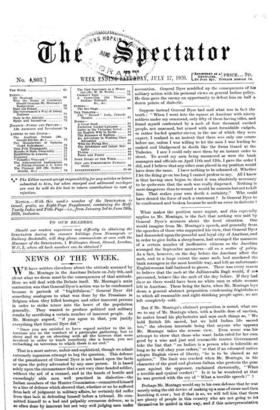That is a most untrue, unfair and sophistical, though we
admit extremely ingenious attempt to beg the question. This defence of the punishment of General Dyer is not based upon the facts or upon the policy advocated by any sane person. It is based solely upon the circumstance that a not very clear-headed soldier, without the aid of a counsel, and in the hands of hostile and exceeding]; able men well practised in dialectics—the Indian members of the Hunter Commission--committed himself to a line of defence which showed that, whether or no he suffered from lack of judgment in military affairs, he certainly did suffer from that lack in defending himself before a tribunal. He com- mitted himself to a bad and palpably erroneous defence, as is so often done be innocent but not very well judging men under
accusation. General Dyer muddled up the consequences of hie military action with his personal views on general Indian policy. He thus gave the enemy an opportunity to defeat him on half a dozen points of dialectic.


































